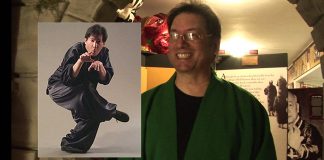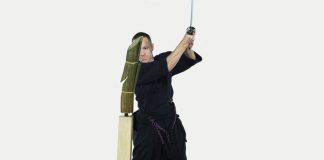1. Give us a little background about yourself and both your careers, as a boxer and sports lawyer.
As a child, I went into sports, starting with team sports and track and field athletics. In the mid 80s, when women’s judo came into view, I became a successful fighter. Within two years I won Kyiv championships, and was awarded in championship of Ukraine, and in a range of international tournaments. But judo was not my dream sport. In 1991 I met a trainer promoting woman in kickboxing and boxing, and he helped me understand that that was exactly what I wanted and needed. I made considerable progress in popularity in 90s kickboxing, and in 1992 I was awarded my first silver medal in WAKO X Europe Championship in Greece, followed by the bronze medal in WAKO IX World Championship in Budapest in 1993. My 1993 my professional dream came true – I entered the faculty of law of the famous National Taras Shevchenko University of Kyiv. It was easy for me to study, I enjoyed my studies and continued in kickboxing as well. In 1995, I became World Champion in WAKO X Kyiv World Championship, and WAKO European Professional Champion. In 1997, in Milan, I became the World Professional Champion according to American ISKA.
In 1998, I graduated from the magistracy of the faculty of law, and got the position of the legal department leader in a joint-stock company, where I’d worked for a period of six years. Then I headed the legal department in a group of companies of Ukrainian for one of the major transnational operators of the gambling industry. Casinos for me became not the place of amusement, but a place of professional activities.
Following several years of working my legal career, and giving birth to my son, I came back to sports and starting in 2003, I began working in professional boxing. In April 2005, in Marseille, I fought for the WBA Box World Champion.
2.What made you decide to make the switch from athlete to sports professional?
I have always dreamt about fighting, I used to be the leader and participant in all the battle royals, even older boys were often afraid of me. I was not afraid of getting my teeth knocked out, or my nose broken. Everyone thinks my nose is broken due to my sports professional, but this is a hello from my childhood. It shouldn’t be surprising that as soon as women’s judo came into view, followed by kickboxing and boxing, I had pondered over going into it. I used to think “these are the sports for me”.
3. Why law?
I think this was an instinctive choice, but I have never begrudged upon my choice, time and again being satisfied with its correctness. Within years of my practical legal experience, I became one of the best specialists in corporate, economic, administrative, civil law, and intellectual property right.
4. How did your athletic background help shape your professional career? What skills and characteristics from your athletic career do you find most helpful for your professional career?
I wouldn’t speak about sports as in my past, it does help me in my life, first of all it helps me to be organized, promotes my ability to stand up to my opponents, helpos me to remain calm and work irrespective of any weariness, i.e. the best qualities born in my athletic carrier. Even my reputationasf a professional lawyer but not a professional boxer is also born by my past athletic carrier.
5. You’ve mentioned in a past interview that boxing is just a hobby while your law career is your job, why not the other way around with your boxing career your job?
Nothing has changed since that time; I would say I’ve never dreamt about boxing as my job, that would have deprived me of pleasure of boxing being my exciting hobby. Boxing is a hobby, my law career is my job, my life is my family, and I am not going to change my lifestyle.
6. Where are you currently in your boxing career? Do you have any upcoming fights?
Taking into account my age, i.e. now I’m 37, I would say that I’m in the final stage of my boxing carrier but we will see. One year ago, I gave birth to my second child, and now I’m back into sports. As soon as I feel I’m ready, I plan to inform Michele Akaris promotional company thereabout, and want to meet Anne Sophie Mathis. This promotional company used to plan our meeting twice, but something has always prevented it. Taking into account that 80% of her fights she won by KO, there are not many peopel who want to fight her besides me.
7. What are your goals for your boxing career?
Of course, I strive to become a World Champion, but I wouldn’t cry if I fail. In my sports carrier, I’m governed by a principle “it’s not so important that I win or lose, the most important is the way I fight”.
8. Has it been difficult to be taken seriously as a woman in either of your careers?
I’ve never even hesitated, I used to be taken seriously in both my carriers, both in sports and law. Speaking about professional law conflicts, I’m taken seriously as far as am completely qualified in all the issues under consideration. With mockers , my point of view can be proven not only with verbal evidence, but also with fists. This seems to be better than swallowing insults. Proficiency and intelligence shall be based upon fists, otherwise mockers shall step on them.
9. As women’s boxing increases in popularity, what are you doing to promote the sport both in the Ukraine and globally?
One shall ask Ukrainian sport functionaries, but the latter will hardly mention their success in this sphere. Not being a functionary of the Ministry of Youth and Sports of Ukraine, I may be only an example for them. Understanding inspiration of anyone by my own experience makes me happy. With the sponsor’s help, I used to train a woman team going in for single combats. I used to administer get togethers for sparring fights, the latter promoting understanding of training disadvantages and getting necessary field experience. These girls used to compete in boxing, Thai boxing, extreme fighting, and submission wrestling. Say the least of it, this used to be a unique team.
10. Where do you see the future of women’s boxing going?
I hope women’s boxing will be included into the Olympics, if not in Y2012 in London, so in Y2016 in Chicago.
11. Are there aspects of the sport that you would like to see changed?
Box is a set of traditions, one shall not change anything, but for refereeing system: judging notes may be recalled in amateur boxing, for each judge to feel his own responsibility, ‘cause often we see something like judging lawlessness killing the very essence of sport both in women’s and men’s sports.
Speaking about women’s amateur boxing, I’d pay attention to the dressing of participants. Today we see men’s mid leg shorts, and men’s dimensionless “undershirts”. Spectators see a fight of dystrophic boys, if not more comic. As one my friend said (he was a sponsor of my team) having watched women’s amateur boxing, “Never will this sport be profitable”. Just fancy interest of spectators in synchronous swimming, track and field athletics, gymnastics or beach volleyball, should women participants be dressed in men’s “undershirts” and mid leg shorts…
12. Do you have any advice for aspiring athletes or sports professionals?
Hardly professional sportsmen need my advices. Speaking about girls starting their carrier in boxing or other single combat sports, I would advice them to appraise their personal psychological and forceful qualities, and start their training only if they are absolutely definite in meeting a real rival in a real fight. Otherwise they would be disappointed. Dancing, aerobics, and usual trainings will be much more profitable for such girls if compared with time spent for boxing trainings. Whatever we may say, boxing and fighting sports don’t fit every woman, just like it’s not for all men!
Wednesday, June 03, 2009





